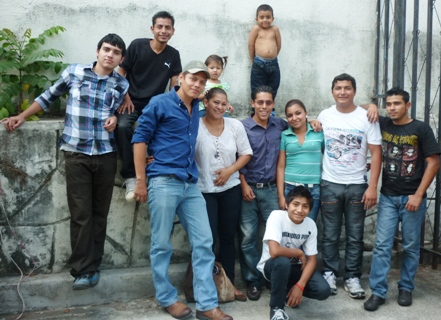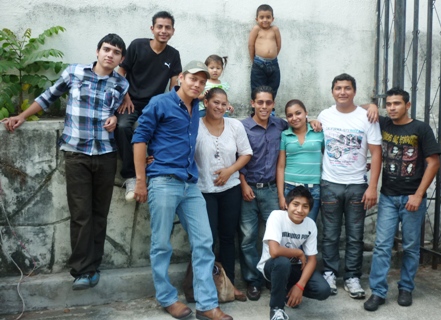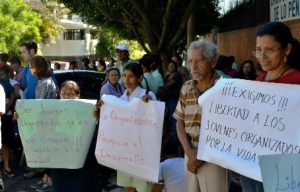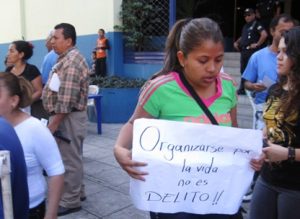Sister Cities
Youths Released from Jail, but Fight to Have Charges Dropped Continues
 February 14th, 2012
February 14th, 2012
On Wednesday, February 6th, a special hearing was held for the 10 young leaders from the communities of El Progreso 3 and Santa Cecilia –members of the Movement of Popular Resistance (MPR-12) – who were accused of illicit association. Of the 10 young men, 8 were arrested early in the morning of December 12th and the other two spent the past months in hiding.
To the relief of their families and community, seven of the eight young activists were released with conditional liberty on February 1st. Their speedy release and the extra-ordinary hearing were direct results of the work of organizations like CRIPDES and the law clinic FESPAD and international solidarity from U.S.-El Salvador Sister Cities, the SHARE Foundation, the Committee in Solidarity with the People of El Salvador (CISPES), Voices on the Border, and the Joining Hands El Salvador. These organizations signed a solidarity statement and participated in a press conference on January 28th outside of the Specialized Court of Organized Crime.
The specialized court system through which the young leaders are being tried was established with the Law Against Organized and Complex Crime which was passed in 2006. In 2007, President Tony Saca tried to use this law against the so-called “Suchitoto 14”, the CRIPDES leaders captured on their way to a water protest and charged with being terrorists. As the Movement of Popular Resistance declared at the January press conference, this law violates the constitution and organized communities’ freedom of association and right to work for peace, security and tranquility.
Solidarity organizations like Sister Cities decided to support the MPR-12 in the fight to liberate the youth because of the overwhelming influence the U.S. has in the security apparatuses in El Salvador. The specialized court system is made up of police judges trained by the U.S.-run International Law Enforcement Academy (ILEA). The raid in which these youths were first arrested was carried out by a police force that receives training at the ILEA and whose director is a graduate of the School of the Americas.
Prior to the press conference on January 28th , the attorney general of the specialized court system had determined that that it would take three to six months before the youths would be able to have their first hearing. This long-wait time is one of the ways the Law against Organized Crime violates the Salvadoran Constitution, which states that “any individual accused of a crime will be assumed innocent as long as their guilt remains unproven according to the law for public trial, in which the accused is guaranteed the right to defend his/her case.”
After the February 6th hearing, the triumphant young leaders shared their experience at a national assembly of the MPR-12. They described conditions in the prison where 50 inmates occupied a space of approximately 12 feet by 12 feet. “To sit down, we had to take turns, and to sleep we had to squeeze up close to one another,” said 24-year-old Marvin Marroquín.
Ronald Escobar, 19 years old, spoke about aggression of the prison guards. “The police would kick us when they passed by. During cell inspections they would throw away all our belongings and make us lie down with our mouths on the floor, which was covered with filthy water.”
Click her to read an interview with Emerson Marroquin about his harrowing incarceration experience>>
For 22-year-old Hugo Rosales, this was his second experience being incarcerated under the specialized system. After his first arrest in a police raid, Hugo was held in jail for 22 months while the specialized attorney general’s office collected evidence against him for the first hearing, in which he was finally declared innocent. Yet the only evidence that was needed to incarcerate him in the first place was an accusatory note written by a member of the Anti-Gang police squad. Due to his incarceration, Hugo was only able attend school up to the 8th grade.
According to Hugo, his case was not unique. He met many other young men in jail who had been waiting between three months to two years to have an initial hearing. “We were thrown in jail for being young and organized,” he says. Indeed, some of the evidence the police have used against the young men was photos of them playing soccer, painting banners for marches and helping with other community activities.
Unfortunately, the trial of the young men continues, despite all the evidence the lawyers from FESPAD have presented demonstrating that these youths are distinguished students and hard workers who have support the development of their communities. Their next hearing will be held in March. Until then, the youth are fearful that they could be thrown in jail again and see their personal and community development impeded once again. Nonetheless, the young leaders are eager to get back to organizing. They are planning a soccer tournament in El Progreso 3 and working on starting a silk-screening project and an organic agriculture collective. In addition, they hope to continue leading workshops on youth organizing and militarization, using their own personal experience as lessons for how to defend the rights of young people.
For their academic performance and community leadership, several of the young men have been offered scholarships. Emerson Vazquez and Giovanni Aguirre, both 23 years old, have been awarded scholarship to study Architecture and Sociology, respectively, at the National University. Ronald was awarded a scholarship in October to study Electricity in the Salvadoran Institute for Technical Training (INSAFORP) and Marvin was given a scholarship to study silkscreening at the National Arts Center (CENAR). However, after their six month incarcerations, all of them run the risk of losing their scholarships.
All of the young men expressed their gratitude for the support and advocacy efforts of the solidarity movement that facilitated their speedy liberation. They asked for continued support to make sure they false charges against them are dropped and to continue pressuring the police to respect the human rights of the young people in Santa Cecilia, El Progreso 3 and marginalized urban communities throughout San Salvador.



